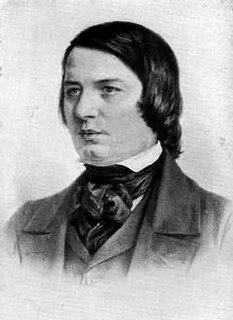
Robert Schumann: Piano Concerto in A Minor
Justus Frantz, Piano
Leonard Bernstein (conductor), Vienna Philharmonic
Robert Schumann represents the best of musical romanticism. Along with other important composers such as Chopin and Liszt, he defined the music of the Romantic period. His music is filled with a superabundance of feeling, imbued with a sensibility that is poetic, which has never been encountered previously. Whereas Beethoven before him preoccupied himself with grandiose heroic and profound life-and-death themes, the Romantics substituted that with individualistic and intesely emotional themes. The melodies are clearly defined, treated with extraordinary passion, delicacy and never-heard-of-before virtuosity. Along with Schumann, the compositions of Brahms easily come to mind, exploited to overblown proportions, however, by Rachmaninoff.
Schumann’s personal life was one of tragedy. He sired eight children with Clara Wieck (the pre-eminent pianist of her time), four of whom died; his wife was known to have had an affair with Johannes Brahms, Robert’s friend and mentor in many ways; and that in the end, he lost his mind, became suicidal and eventually spent the last years of his life in an asylum.
If he were Beethoven and Mozart, his music might have reflected the shift in his personal outlook and views. Both composers’ music became increasingly complex and personal towards the end of their lives, became darker and indeed, spiritual (Beethoven’s Misa Solemnis, the late quartets, the Choral Symphony and Mozart’s later concertos and the unfinished Requiem mass are clear examples).
Schumann’s work, however, seems to date back to a happier period, at the height of his powers. His only piano concerto in A Minor is a perfect example, interpreted here by Justus Frantz and the Vienna Philharmonic under Leonard Bernstein.
Schumann appears to be more comfortable with the piano rather than with the orchestra. His orchestration sounds rather dry, sparse and uneven, compared to his piano writing, which is brilliant. His symphonic works are somewhat uniform in style, they all sound similar although his melodic ideas that we have come to love remains solidly intact. His piano works, however, are among the most complex in the repertoire. His mode of expression is so refined, down to the slightest difference in shading in the sound. Not surprisingly, his best orchestral work is his lone Piano Concerto, rather than his Symphonies.
This concerto is probably the best ever composed for the instrument. The wonderful melodic ideas, the rhythmic vitality, the clarity of the layout of the movements, and the marvelous piano writing have made it a standard fare among the world’s best pianists.
The first movement opens with a fiery outburst from the piano, answered and sustained by a delicate theme throughout by the woodwinds. The luxuriant tone and the knightly motif lead to the gracious and gentle intermezzo of the second movement, with the cellos providing the main theme and dreamily ornamented by the piano. Immediately after, the piano breaks into the powerful last movement, with the soloist displaying even more technical virtuosity and brilliance, and leads the work to its electrifying and truly breathtaking close.
I think Frantz missed some bars in the last movement, but most people won’t notice it anyway. Bernstein’s orchestra was surprisingly dynamic, despite its clearly supporting role.
Along with Chopin’s E Minor Concerto, this is my favorite Piano Concerto, ever since I first heard of it over that born-again FM station, 98.7 DZFE, “The Master’s Touch”. I listen to it when unwinding or simply relaxing. Highly recommended.
No comments:
Post a Comment